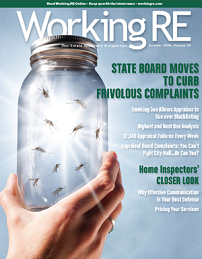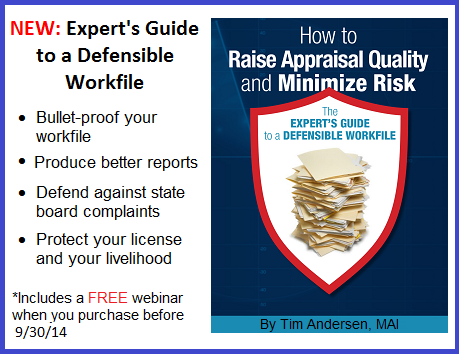 |
>> See Past News Editions >> Click to Print > NEW: State Appraisal Board “Insurance”-Bulletproof Your Workfile The new 2014 Expert’s Guide to a Defensible Workfile shows you how to “bulletproof” your workfile and protect your appraisal license and livelihood. Produce better reports: Click here to learn more. >Want to be a better FHA Appraiser? The FHA Checklist and eBook keeps you up-to-date on FHA requirements, helps you be more efficient on FHA Inspections and keeps you off their “do not use” list. Click here to learn more. |
Editor’s Note: Real estate attorney Todd Stevens sees a trend in real estate law: attorneys are waking up to the potential liability of review appraisers. Couple this with the common misunderstanding among review appraisers that their risk is less than the author of the original report, and you get a burgeoning new area of litigation.
Review Appraisal Liability
By Todd Stevens
In my practice, review appraisers increasingly are being named as defendants in lawsuits. In the typical transaction, the review appraiser has a contractual relationship with the lender while the original appraiser, retained by the mortgage broker or Appraisal Management Company (AMC) to perform the original report, does not. Lenders usually include language shifting some of the risk of loss to the reviewer. Lender/reviewer contracts often contain provisions permitting the party prevailing in a lawsuit to recover court costs as well as the fees paid to lawyers. Carefully read any contract you are asked to sign by a lender who is hiring you for review work. You may be able to negotiate out some of the more onerous provisions.
As a rule, lenders tend to insist that appraisers on their approved list be covered by errors and omissions insurance. When a loan defaults, the lender, armed with the contractual language just discussed, sues the appraiser, confident that insurance coverage exists for the claim. I frequently hear the common myth, “if I didn’t have E & O insurance the lender would not sue me.” Wrong. I often get calls from uninsured appraisers who have been sued. In fact, until you are sued, the lender cannot be absolutely sure whether coverage exists for the claim. In my opinion, the need for E&O coverage has never been greater. The real estate market is strong in most areas of the country with non-performing loans being relatively rare. This being the case a lender may litigate even if the loss is modest.
Reviewer Liability
Another big myth is that reviewers have less liability than the original appraiser. In fact, I have heard some attorneys argue that reviewers have more liability than the original appraiser since reviewers have the “last” opportunity to correct any problems with the report. While I am unaware of any case precedent specifically addressing this issue, logic dictates that the liability of a reviewer and the original appraiser are the same. Both the appraiser and the reviewer are performing the same task: opining on the fair market value of the subject property.
(story continues below)

(story continues)
My reviewer clients argue that their liability should be less since reviewers typically do not view the interior of the property and may not drive by the comparable properties. I have never argued the “diminished liability” defense to a court but I suspect that it may fail. The client of the reviewer relies on both the original report and on the review. Actually, in the customary refinance or purchase transaction, a lender may place greater reliance on the review because they usually hire an approved reviewer with whom they are familiar and have confidence.
Avoiding Reviewer Liability
Reviewers can be placed under tremendous pressure to concur with the value in the original report. You become the proverbial “rain on the parade” if you disagree. If that’s the case, so be it. Uncovering situations where the value is not there is the reason a review appraiser is hired. Rest assured that if you agree with the original report and the loan defaults, the lender will send both reports to yet another appraiser to determine if there is any appraiser negligence. Lenders and participants in the secondary loan market will often ask the original appraiser to consider other data to verify their report. Making adjustments to the value in your own report is risky unless you can defend it adequately.
(story continues below)

(story continues)
Never review a completed and delivered appraisal rendered by your own firm. All appraisers affiliated with one firm are treated as one entity for liability purposes. So, for the reason stated above, do not review the work of other appraisers in your firm. Even if you agree with the value reached in the original report, include in your review any mathematical errors or substantive problems you found. This will demonstrate that you carefully reviewed the original report and considered the defects, but concluded that they did not affect the value. Include any limitations imposed upon the review in the narrative portion of the review.
Bottom line: review appraisals should be performed with as much care as a complete report. With this in mind you can avoid reviewer liability.
September’s “Better Appraising” Webinar (in two parts)
“Excellent presentation and looking forward to part 2.” -R. Estrada
Watch at Your Own Convenience!
Part 1: Defining Market Value & How to Adjust for Concessions
Available for immediate download.
In this webinar, Richard Hagar, SRA explains why Sales Price and “Market Value” are not always the same and how the federal definition of concessions may differ from what borrowers, agents and lenders believe. “Market Value” is the value appraisers are required to use when appraising property for a federally regulated transaction. The definition is included in every appraisal for a lending institution and failure to appraise “by the book” can result in the creation of a misleading appraisal, an appraiser losing his or her license, and fraudulent loans being approved by lenders. In this webinar, Hagar shows appraisers how “concessions” impact sales prices and market value and how to properly handle them in every appraisal. Sign Up Now!
Part 2: Defining Market Value & How to Adjust for Concessions
Available for immediate download.
In this webinar, Richard Hagar, SRA shows appraisers how to measure the impact of concessions on sales prices and “market value.” How can you determine if a comparable has concessions? Hagar shows you how to identify comparables with concessions and walks you through how to use regression analysis, match paired sales analysis, the cost approach, the income approach and more to identify and adjust for concessions in both the subject property and comparables. Sign Up Now!
About the Author
Todd F Stevens is a partner in the law firm of Keeney Waite & Stevens in San Diego. He specializes in real estate litigation with an emphasis on the defense of real estate professionals. His telephone number is 619-238-1661. Mr. Stevens is the immediate past-president of the San Diego County Bar Association.
We’re always listening: Send your story submission/idea to the Editor: dbrauner@orep.org.


by Bryan
I have heard for a long time now that review appaisers are more at risk. However, I have never heard any evidence to back this up. I think it is urban legend. While I understand your thought that both should be liable as they both provide a value I think you are incorrect. While the review appraiser is giving a value they are giving a value based on items from the original report. Clearly they are not the same thing. As far as overall liability goes a reasoned person would see a reviewer as having less risk – when they concur with value – as now you have two experts who agree on the value conclusions.
-by Edd Gillespie
You covered all of the bases Mr. Stevens. It boggles my mind why anyone would perform a review for the low fees offered or try to do one on a Fannie form, let alone offering their own opinion of value without having first gone through a thorough appraisal development.
The reason I most often hear from appraisers who do review of 1004 appraisals is that their business requires it. I admire Mr. Raymond for being concerned about the profession of appraising, but the practice of review is used to throw appraisers under the bus and lenders suing appraisers and reviewers is nothing short of ISIS guarding the White House.
-by joe raymond
As a staff government appraiser, I was feared by all the contract appraisers because I would pick their work apart. I did this because, I believe the profession is more important than the individual. I got better appraisals. As a contract fee appraiser, I have turned down several request to be a reviewer. If you can not back your position as a reviewer, you are more liable than the original appraiser. Because of this, reviewers should be paid at least twice what the original appraisers fees are. it takes twice as long to do a good review! Remember you get what you pay for!
-